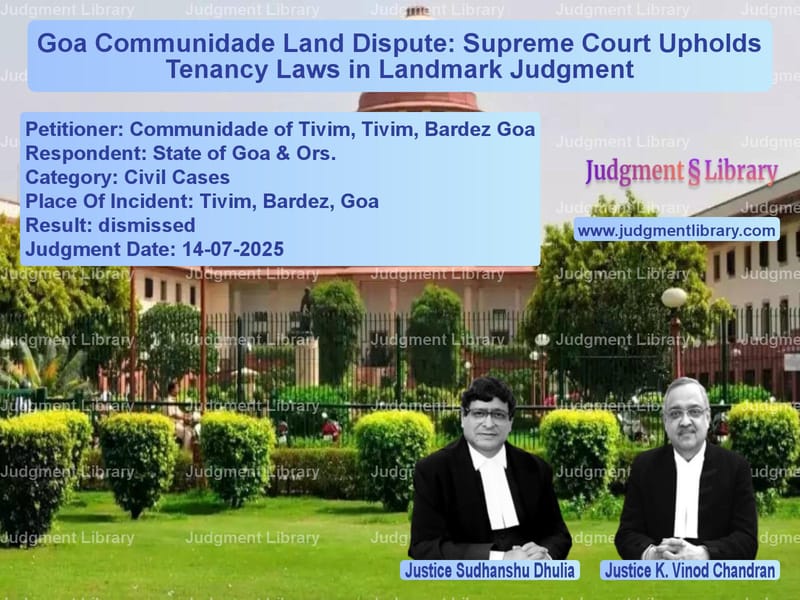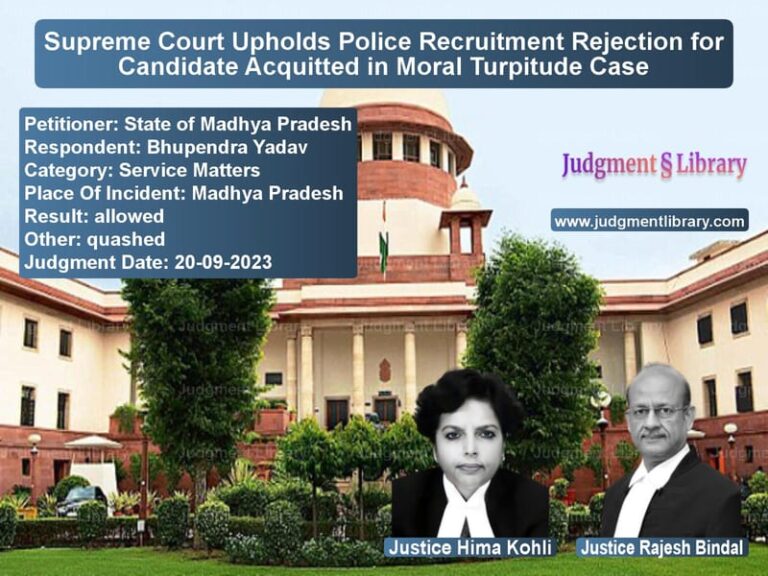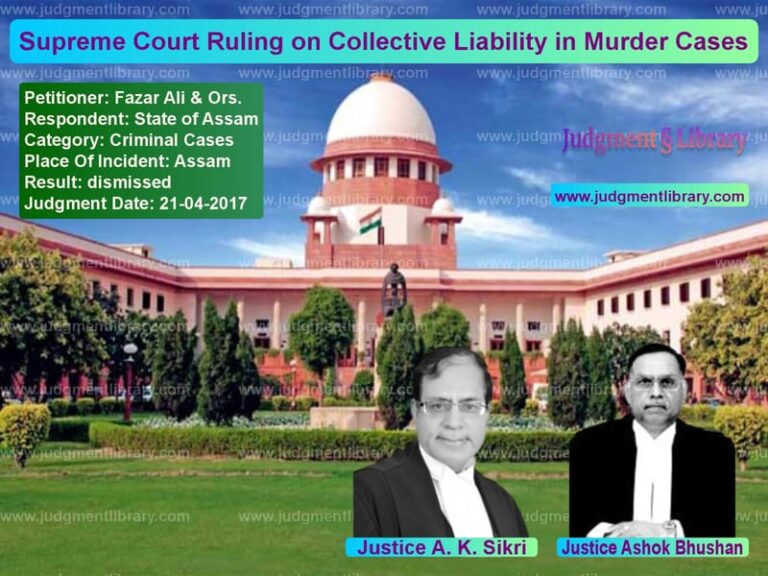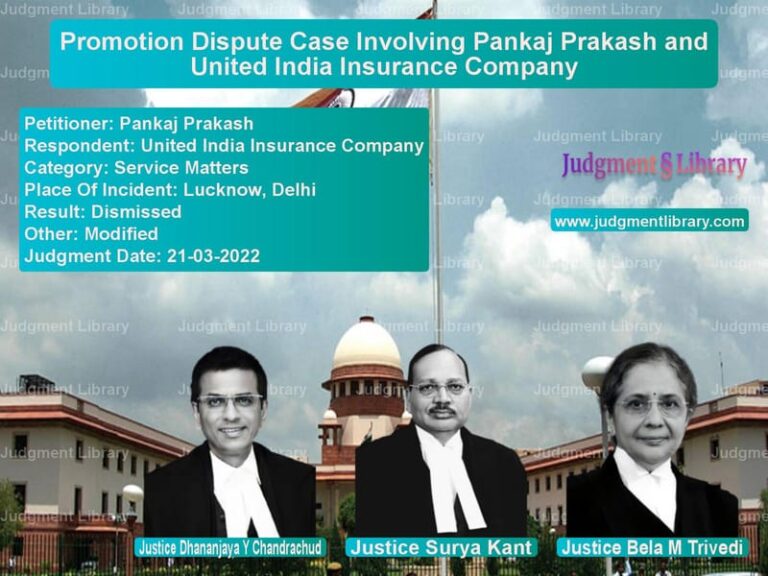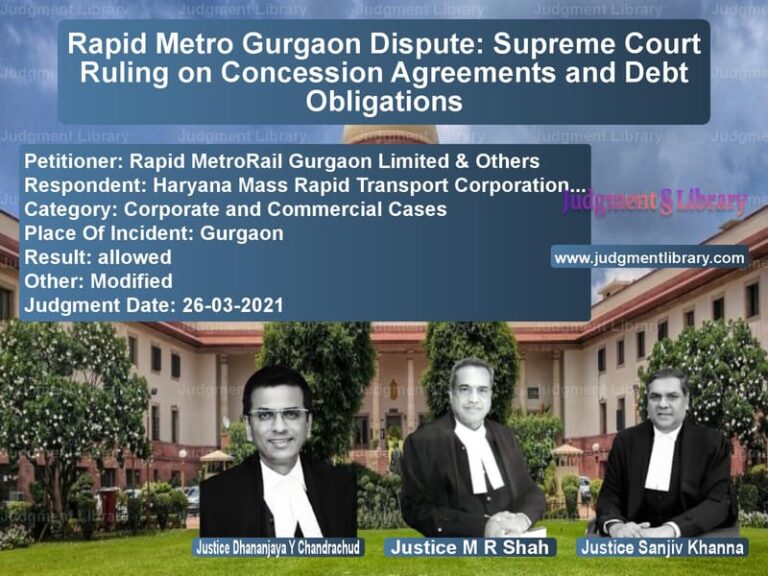Goa Communidade Land Dispute: Supreme Court Upholds Tenancy Laws in Landmark Judgment
In a significant judgment that reinforces the sanctity of agricultural tenancy laws in Goa, the Supreme Court recently dismissed an appeal by the Communidade of Tivim, upholding the decision that prevented the unique village community from entering into a compromise agreement that would have circumvented statutory protections for tenants. The case, which involved the delicate balance between traditional community land rights and modern tenancy protections, has far-reaching implications for land disputes in Goa and reaffirms the principle that private agreements cannot override statutory frameworks designed to protect vulnerable sections of society.
The dispute centered around two agricultural properties in Tivim village of Bardez, Goa, known as “Oiteil-De-Madel” and “Levelechy Aradi,” which had been leased to the predecessors of private respondents back in July 1978. The Communidade, a unique agricultural association based on the traditional ‘Gaunkari System’ of collective village ownership, found itself in a legal battle after the tenants sought formal recognition of their tenancy rights under the Goa, Daman and Diu Agricultural Tenancy Act, 1964.
The Legal Battle Unfolds
The case had a long history, beginning with a civil suit filed by the predecessor of the private respondents seeking formal recognition as tenants. When this suit was decreed in 1986 and no appeal was filed, the matter attained finality. However, after the original tenant’s death in 2015, his successors filed a fresh tenancy application in 2016, which was granted by the Trial Court in 2017 after the Communidade failed to appear despite service of notice.
It was during the pendency of the appeal against this 2017 judgment that the Communidade decided to pursue a compromise. In extraordinary general body meetings held in 2021, the community resolved to bifurcate the disputed land in a 60:40 ratio, with 60% going to the private respondents and 40% remaining with the Communidade. However, under Article 154(3) of the Code of Comunidades, such compromises required permission from the Administrative Tribunal, which was denied in April 2023, leading to the current legal battle.
The Arguments Before the Court
Mr. Huzefa Ahmadi, learned counsel for the appellant Communidade, presented compelling arguments in favor of the compromise. He contended that “the best interests of the appellant and its members have to be considered and both the High Court as well as the Administrative Tribunal have failed to take into consideration the fact that the appellant had finalised consent terms, keeping in mind its best interest and in the absence of such terms, the suit properties would have to be regarded as ‘tenanted land’ which is allotted to the private respondents herein, which would in turn be contrary to the appellant’s best interests.”
Mr. Ahmadi further argued that “the Code itself by virtue of Article 30 (4) (g) empowers the Communidade to deliberate upon, the withdrawal and compromise of civil suits and this aspect of the matter was completely ignored by the High Court.”
On the other side, Mr. Abhay Anil Anturkar, representing the State of Goa, strongly supported the Administrative Tribunal’s decision. He argued that “the consent terms sought to be entered into between the appellant and the private respondents is nothing but an attempt to bypass and negate the provisions contained in the Tenancy Act as well as the Goa Land Use (Regulation) Act, 1991.”
The State’s counsel pointed to specific clauses in the consent terms that essentially conferred “‘all rights and interests, which rights shall be akin to full ownership rights’ over 60% of the land” to the private respondents, while the Communidade would get “‘exclusive rights free from any tenancy claim’ over 40% of land.” Additionally, these clauses allowed both parties to use their respective shares “‘for any purpose whatsoever'” and “‘in the manner deemed fit and proper.'”
The Supreme Court’s Analysis
The Supreme Court, comprising Justices Sudhanshu Dhulia and K. Vinod Chandran, delivered a comprehensive judgment that carefully examined the statutory framework and the proposed compromise. The Court firmly held that “the Administrative Tribunal has rightly refused to grant permission to the consent terms finalised by the appellant. A bare perusal of the same indicates that it is nothing but an attempt to circumvent the statutory framework laid down in Tenancy Act and also violates the Land Use Act.”
The Court expressed complete agreement with the Administrative Tribunal’s reasoning, noting that “these terms effectively wipe out tenancy rights of the private respondents which was declared by the Trial Court vide judgment dated 01.09.2017 and by the proposed compromise, the parties have agreed that in lieu of the 60:40 bifurcation of land between them, the judgment dated 01.09.2017 stands set aside.” The Court observed that this approach meant that “instead of testing the correctness of judgment dated 01.09.2017 on merits before the appellate court, the parties intend to set aside the judgment by way of compromise.”
Violation of Tenancy Act Provisions
The Court conducted a detailed examination of the Tenancy Act, particularly focusing on Section 9 which specifies the only three modes through which tenancy can be terminated. The Court noted that “Section 9 of the Tenancy Act lists down the modes of termination of tenancy and specifies that tenancy can only be terminated via three modes.” These include surrender by the tenant, termination by the landlord on specific grounds, or termination under any other specific provision of the Act.
The Court found that “by means of the proposed compromise, the parties have essentially terminated the tenancy, without recourse to any of the modes referred to in Section 9 of the Act.” This fundamental violation of the statutory framework made the compromise legally untenable.
Circumvention of Purchase Procedure
The judgment extensively discussed Chapter IIA of the Tenancy Act, titled “Special rights and privileges of tenants,” which establishes a detailed procedure for tenants to purchase land from landlords. The Court noted that “Section 18A in this chapter provides that every tenant shall be deemed to have purchased from his landlord, the land held by him as a tenant on the tillers’ day, subject to other provisions of the Act.”
The Court emphasized that “if the proposed consent terms are to be allowed, not only would the tenant be conferred full ownership rights, in complete disregard of the procedure for purchase mentioned above, but it would also mean that the tenant would be conferred a right to alienate land, without seeking permission of any statutory authority.” This would directly contravene Section 18K of the Tenancy Act, which prohibits tenants who have purchased land from transferring it without the Mamlatdar’s prior permission.
Violation of Land Use Act
The Court also examined the implications under the Goa Land Use (Regulation) Act, 1991, particularly Section 2 which explicitly states that “no land which is vested in a tenant under the provisions of the Goa, Daman and Diu Agricultural Tenancy Act, 1964 shall be used or allowed to be used for any purpose other than agriculture.”
The Court found that the proposed consent terms, which allowed both parties to use the land “for any purpose whatsoever,” directly violated this statutory prohibition. The Court concluded that “the compromise not only circumvents procedural aspects contained in Chapter IIA of the Tenancy Act but also allows the parties to use the suit properties for a purpose which is expressly barred by the Land Use Act.”
Abuse of Legal Process
In one of the strongest passages of the judgment, the Court characterized the proposed compromise as “nothing but an abuse of the process of law. The so called compromise or agreement is a ploy to defeat the provisions of law and therefore it has been rightly denied the legal sanctity which was sought.”
The Court also addressed the Communidade’s argument regarding Article 30(4)(g) of the Code of Comunidades, clarifying that while this provision empowers the community to deliberate upon compromise terms, “by no stretch of imagination can this provision be construed to mean that it confers an unfettered power on the Communidade to enter into a compromise, without the Tribunal’s sanction.”
Broader Implications
This judgment has significant implications for land disputes in Goa, particularly those involving Communidades and tenancy rights. It reinforces the principle that statutory protections for tenants cannot be bypassed through private agreements, no matter how mutually beneficial they may appear to the immediate parties.
The Court’s firm stance ensures that the procedural safeguards built into tenancy legislation remain effective in protecting the rights of agricultural tenants, who are often in vulnerable positions relative to landowners. At the same time, the judgment recognizes the unique position of Communidades in Goan society while making it clear that they must operate within the framework of general laws.
By dismissing the appeal and upholding the decisions of the lower forums, the Supreme Court has sent a clear message that attempts to circumvent statutory protections through creative legal arrangements will not be tolerated. The judgment preserves the integrity of tenancy laws while allowing the original tenancy appeal to be decided on its merits, as the Court specifically clarified that it had “expressed no opinion whatsoever on the merits of the dispute between the appellant and private respondents as regard the claim of Tenancy.”
This balanced approach ensures that both the Communidade’s rights and the tenants’ statutory protections will be properly considered in the appropriate legal forum, following the established procedures rather than through agreements that shortcut statutory requirements.
Petitioner Name: Communidade of Tivim, Tivim, Bardez Goa.Respondent Name: State of Goa & Ors..Judgment By: Justice Sudhanshu Dhulia, Justice K. Vinod Chandran.Place Of Incident: Tivim, Bardez, Goa.Judgment Date: 14-07-2025.Result: dismissed.
Don’t miss out on the full details! Download the complete judgment in PDF format below and gain valuable insights instantly!
Download Judgment: communidade-of-tivim-vs-state-of-goa-&-ors.-supreme-court-of-india-judgment-dated-14-07-2025.pdf
Directly Download Judgment: Directly download this Judgment
See all petitions in Property Disputes
See all petitions in Landlord-Tenant Disputes
See all petitions in Contract Disputes
See all petitions in Specific Performance
See all petitions in Damages and Compensation
See all petitions in Judgment by Sudhanshu Dhulia
See all petitions in Judgment by K. Vinod Chandran
See all petitions in dismissed
See all petitions in supreme court of India judgments July 2025
See all petitions in 2025 judgments
See all posts in Civil Cases Category
See all allowed petitions in Civil Cases Category
See all Dismissed petitions in Civil Cases Category
See all partially allowed petitions in Civil Cases Category

